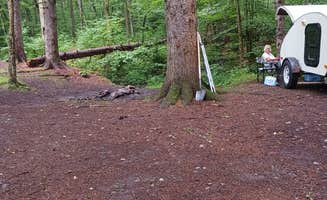Dispersed camping near Depew, New York includes several free and low-cost sites within the state forest system. These areas typically receive less traffic than developed campgrounds, especially on weekdays. Winter access can be challenging in this region where annual snowfall averages 90-95 inches, significantly higher than surrounding areas due to lake effect snow from Lake Erie.
What to do
Hiking interconnected trails: Boyce State Forest offers access to the Finger Lakes Trail system, providing connections to longer routes for day hikes or backpacking trips. A camper noted, "If roughing it is your thing this is primitive tent sites on a small pond located on the Finger Lake Trail."
Wildlife observation: Camp Seneca provides opportunities to observe local wildlife from established sites. The creek-side locations allow for quiet observation during morning and evening hours. Visitors report seeing various woodland creatures, particularly at dawn and dusk.
Fishing opportunities: Several small waterways and ponds throughout the region's state forests permit fishing with proper New York State licenses. Local anglers recommend spring and early summer for best results, particularly for native species in less-traveled waters.
What campers like
Creek-side sites: Campers particularly value the sites situated along waterways. According to one review about Camp Seneca, "We picked the biggest site next to the creek. The tree canopy over our site was dense enough that w3 did not get very wet when it rains."
Privacy between sites: The natural spacing between dispersed sites creates a more solitary experience compared to developed campgrounds. This separation appeals to campers seeking quieter surroundings, with one visitor reporting, "This campground had several designated sites and most have a fire ring and picnic table."
Basic amenities at select locations: While facilities are minimal, some sites offer unexpected conveniences. At Boyce State Forest, a reviewer mentioned the lean-to "came with some firewood and cardboard to burn as well as some emergency water. Campsite was clean and came with an 'air conditioned loo'."
What you should know
Variable ground conditions: Terrain at these sites can be challenging, particularly after rain. A camper at Boyce State Forest advised, "Would recommend to come in dryer season or to bring rubber boots."
Limited maintenance: Unlike staffed campgrounds, dispersed sites receive minimal upkeep. Campers should expect to find and leave sites clean, but facilities like toilets may receive only periodic servicing.
Seasonal availability: Roads accessing these areas may close during winter months or following significant precipitation. Spring access is particularly unreliable due to snowmelt and mud season conditions.
Tips for camping with families
Choose drive-in sites for convenience: When camping with children, the drive-in access at McCarthy Hills Forest reduces the complexity of transporting gear and supplies. This eliminates the half-mile hike required at some locations.
Verify toilet facilities beforehand: Not all dispersed sites offer toilet facilities. Camp Seneca provides "a porti-poty on site that had plenty of paper was pretty clean," according to a recent visitor, making it more suitable for families with young children.
Pack additional water supplies: None of these dispersed camping locations provide drinking water. Families should calculate approximately 1 gallon per person per day, adding extra for food preparation and basic hygiene.
Tips from RVers
Size limitations for dispersed camping: Most free camping near Depew is best suited for smaller recreational vehicles. English Hill State Forest access roads and sites cannot accommodate large rigs or trailers exceeding 25 feet.
Uneven parking areas: Bring leveling blocks and chocks as most dispersed sites lack graded parking pads. Some locations may require significant leveling depending on recent ground conditions and site location.
Pack-out requirements: With no trash facilities available, RV campers must plan for complete waste management. Carrying extra storage containers for trash and scheduling disposal stops will maintain site cleanliness.


